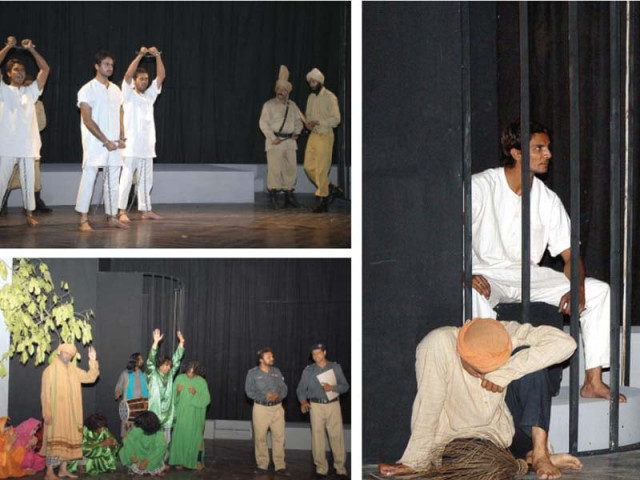Youth Festival: Plays, films examine governance
Students portray what makes a good govt as the 9th Youth Performing Arts Festival comes to an end.

Alhamra Hall No 1 was already packed before University of Engineering and Technology students started Barzakh, a Persian word for the state between the world and the hereafter. The play is set in a medieval kingdom where there is extreme disparity between the ruling class – the king, his army and priests and their subjects. Zarqam, a royal courtier who is assigned to raise the prince, tries to convince the king that the priests are exploiting the populace by invoking multiple fake gods in order to extract tributes of wheat.
The priests’ hoarding of wheat stocks leads to famine and disease. Zarqam and the prince then raise an army of rebels and, like Robin Hood, shift to the nearby forests from where they lead raids of temple godowns filled with wheat stock and distribute the loot among the poor.
Meanwhile, the king is wracked with guilt. Every night, he gets bloody nightmares depicted in nicely-done dream sequences at the end of each act of the play. The dreams, says a captured Zarqam to the king, were calling on him to sacrifice something.
The king orders Zarqam’s death, but takes his advice. He takes his army and his priests and moves to temples built on the side of a volcano so they may “seek the forgiveness of the gods”. The volcano explodes, taking out all the clerics and the army. The prince is left to ascend the throne and start a new, peaceful reign.
The play was very well made and successfully captured the audience’s attention for the whole running time of one hour. Arsalan Fida, the writer and director, told The Express Tribune that the message in Barzakh was the importance of “sacrificing your most dearest thing”. This, he said, was reflected in Zarqam’s advice to the king to sacrifice his riches for his people.
Earlier, Punjab University College of Arts and Design students screened documentaries and a short film in Hall No 2 of the Cultural Complex. Of the nine films, five were about democracy. Ahmed Bilal, who teaches communication design and heads Natak, the college dramatics club, said that he had assigned the topic to five different students to see what their perception of the idea of democracy was.
A Self Portrait, a documentary by Rahat Naveed, gave a snapshot of the insecurity prevalent in our society, said Shahnawaz Zaidi, the former principal of the college. “It is a commentary on how the security situation has affected us,” he said, referring to the checkpoints outside five-star hotels and sandbag walls in front of schools shown in the documentary.
Other documentaries included Chanda Mama, which depicted the lives of homeless children who beg for a living, and for bags of Samad Bond glue. Thug, a short film, shows a simple rural barber being defrauded of his belongings by a conman.
BNU no shining beacon
Students of Beaconhouse National University (BNU) put on a series of musical and theatrical performances on Monday, with mixed results.
The audience enjoyed A Bus Stop, a shadow mime about rivalry between BNU and the Lahore University of Management Sciences, thinly disguised as a love story. BNU, a simple boy, falls in love with Pinky and makes friends with her, but she’s already engaged to LUMS, a punk. It is no surprise when BNU wins Pinky at the end.
Also appreciated was Hamari Awaz, an Urdu skit about suicide bombing and religious fundamentalism. Unlike other performances on the subject at the festival, Hamari Awaz was not preachy or complicated and thus enjoyed by the crowd.
The musical performances were disappointing. Ali Murtaza and Khaqan did an average cover version of Creep by Radiohead. A Reflection Through the Times sought to highlight changing musical trends from the ’60s through to 2010, but ended up driving a lot of people away.
More than half the audience left when a group of BNU students sang Chal Dil Meray and Dil Tu Rona Nai. A cover of Knocking on Heaven’s Door was also particularly poor.
Additional reporting by Saleha Rauf
Published in The Express Tribune, November 30th, 2010.



















COMMENTS
Comments are moderated and generally will be posted if they are on-topic and not abusive.
For more information, please see our Comments FAQ